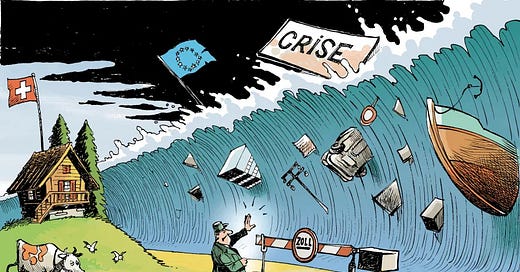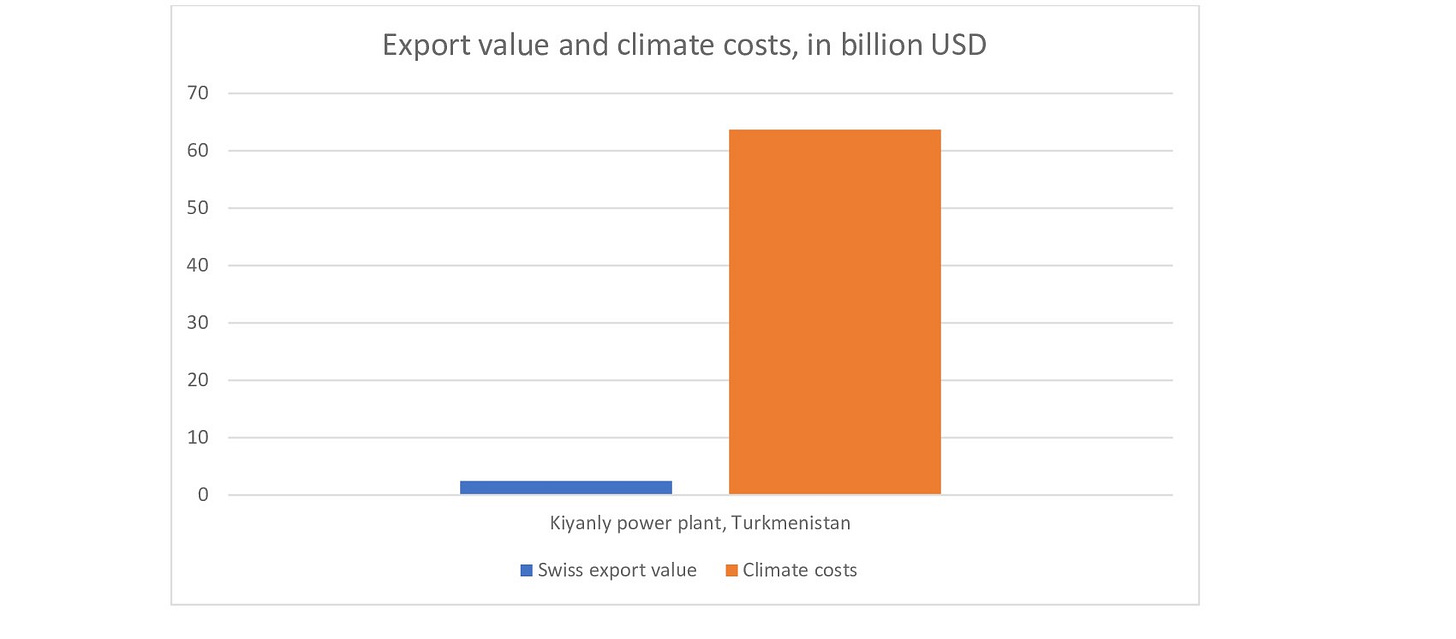Last month we reported that Switzerland is violating its commitment to end all funding for international fossil fuel projects by supporting six gas power plants through its export credit insurance SERV. New information about Switzerland’s role in ongoing climate negotiations reveals the full cynicism of this approach.
(Image credit: © Chappatte in Le Temps, Geneva - www.chappatte.com)
The true costs of Switzerland’s overseas gas projects
The 1,574 megawatt Kiyanly project, a gas-fired power plant in Turkmenistan, is by far the biggest fossil fuel project currently supported by SERV. As the Swiss government will soon reveal in response to a parliamentary inquiry by MP Claudia Friedl, this power plant will emit 4.928 million tonnes of CO2 equivalents per year, a figure which the SERV secretariat has kindly shared with me. This amounts to 128.1 million tonnes over the 26-year lifetime of the project.
For comparison, the Swiss government this month estimated the total Swiss carbon budget for the 2020-2050 period at 660 million tonnes – a figure which Greenpeace and the Climate Seniors dismissed as much too high because it defies a recent ruling of the European Court of Human Rights. Even if we accept the official figures, the Swiss government has agreed to squander one fifth of this budget on a single power plant in Turkmenistan, a corrupt and repressive country which is generating more electricity than it needs. But of course the Swiss government is not taking responsibility for the emissions it creates or enables abroad.
Fossil fuel projects create costs which are not covered by their developers but externalized in the form of climate change and pollution. The Swiss government’s Office for Spatial Development earlier this month calculated the climate costs of CO2 emissions to be at least CHF 430 or $496 per tonne. (The US government applies a lower social cost of carbon of $190 per tonne, while academic researchers have calculated social costs as high as $1,065 per tonne of CO2.) Using the Swiss government’s figures, the power plant in Turkmenistan will cause climate costs of $2.44 billion per year, or $63.6 billion (in current dollars) over its lifetime. These lifetime costs are comparable to the costs of a large Atlantic hurricane.
Blocking a binding agreement
When we criticized the Swiss government for violating its commitment to the Clean Energy Transition Partnership (CETP), SERV representatives argued that their agency was honoring the Swiss commitments in the context of its overall mandate, and that unnamed other countries were worse offenders of their obligations under the CETP.
When you’re concerned that other parties may violate their commitments under a voluntary arrangement, the logical response is to adopt a binding agreement or treaty. And indeed, governments are currently negotiating a binding ban on extending official export finance for all fossil fuel projects within the Export Credit Group of the OECD, following a more limited agreement they established on coal power plants in 2021.
The EU proposes to extend the existing ban on coal power plants “to the fossil fuel energy sector as a whole, except in limited and clearly defined circumstances”. At the last round of negotiations in the Export Credit Group on October 11, Australia, Canada, New Zealand, Norway and the UK all supported this proposal. Yet even though the EU proposal mirrors the language of the CETP, which they had formally supported in 2021, the United States and Switzerland (as well as Korea and Turkey) opposed the proposal. The US and Switzerland are precisely the countries which the International Institute for Sustainable Development in August accused of violating their CETP commitment the most.
The negotiations about a ban of export credits for oil and gas power projects are supposed to conclude on November 18, at the time of the climate COP in Baku. Yet since any OECD agreement requires consensus, it can only move forward if Switzerland, the US and the other opponents change their minds.
Who’s paying the price
In 2023 a large majority of Swiss voters decided that the country should reduce its dependency on fossil fuels and reach net zero emissions by 2050. Yet when it comes to its export interests, Switzerland is a free loader on international climate action: We benefit from everyone else’s climate action while continuing to peddle our own dirty fossil fuel business with less competition.
According to SERV, the Kiyanly power plant in Turkmenistan has a delivery value of CHF 2,118 million, which currently translates into $2,442 million. This is a small fraction of its climate costs of $63.6 billion. The Swiss government is thus prepared to cause 26 dollars in climate damages for every dollar of Swiss exports for the project. Yet it’s not the Swiss government or exporter which will pay for these damages, but the communities affected by climate disasters in Brazil, Nepal, Papua New Guinea, North Carolina and other parts of the world.
Please subscribe here if you are interested in more information on such topics.






this is a real Swiss climate scandal!